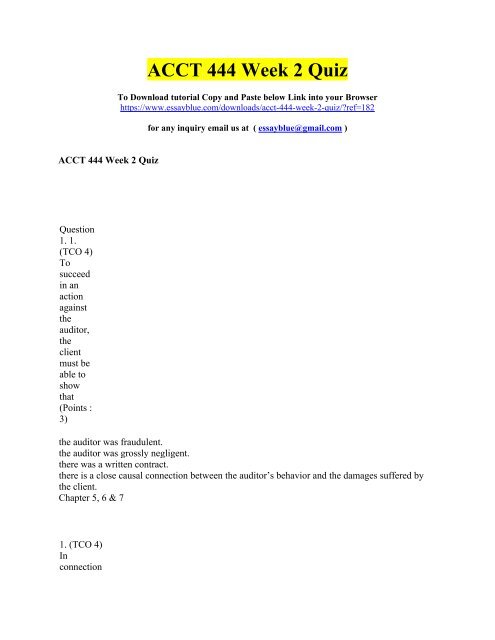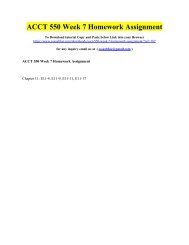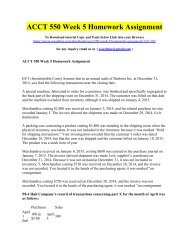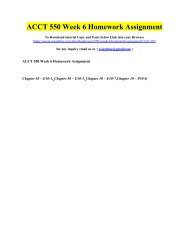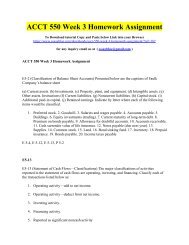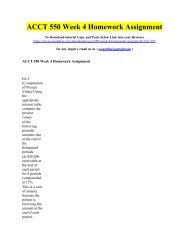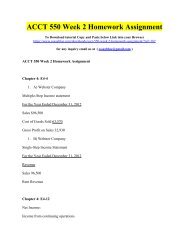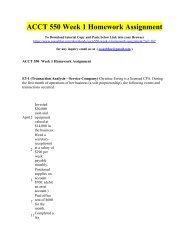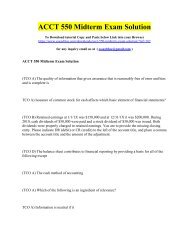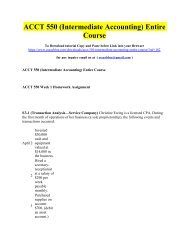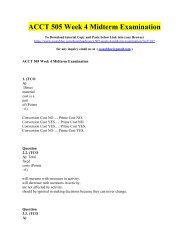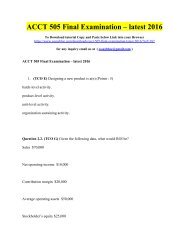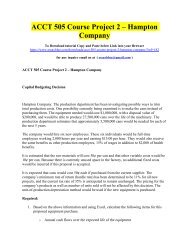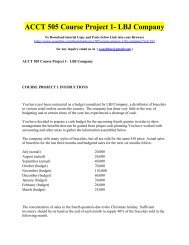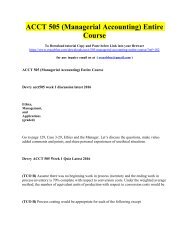ACCT 444 Week 2 Quiz
You also want an ePaper? Increase the reach of your titles
YUMPU automatically turns print PDFs into web optimized ePapers that Google loves.
<strong>ACCT</strong> <strong>444</strong> <strong>Week</strong> 2 <strong>Quiz</strong><br />
To Download tutorial Copy and Paste below Link into your Browser<br />
https://www.essayblue.com/downloads/acct-<strong>444</strong>-week-2-quiz/?ref=182<br />
for any inquiry email us at ( essayblue@gmail.com )<br />
<strong>ACCT</strong> <strong>444</strong> <strong>Week</strong> 2 <strong>Quiz</strong><br />
Question<br />
1. 1.<br />
(TCO 4)<br />
To<br />
succeed<br />
in an<br />
action<br />
against<br />
the<br />
auditor,<br />
the<br />
client<br />
must be<br />
able to<br />
show<br />
that<br />
(Points :<br />
3)<br />
the auditor was fraudulent.<br />
the auditor was grossly negligent.<br />
there was a written contract.<br />
there is a close causal connection between the auditor’s behavior and the damages suffered by<br />
the client.<br />
Chapter 5, 6 & 7<br />
1. (TCO 4)<br />
In<br />
connection
with the<br />
audit of<br />
financial<br />
statements,<br />
an<br />
independent<br />
auditor<br />
could be<br />
responsible<br />
for failure<br />
to detect a<br />
material<br />
fraud if<br />
(Points : 3)<br />
statistical sampling techniques were not used on the audit engagement.<br />
the auditor planned the audit in a negligent manner.<br />
accountants performing important parts of the work failed to discover a close relationship<br />
between the treasurer and the cashier.<br />
the fraud was perpetrated by one employee who circumvented the existing internal controls.<br />
Question<br />
2. 2. (TCO<br />
4) The<br />
principal<br />
issue to be<br />
resolved<br />
in cases<br />
involving<br />
alleged<br />
negligence<br />
is usually<br />
(Points :<br />
3)<br />
the amount of the damages suffered by plaintiff.<br />
whether to impose punitive damages on the defendant.<br />
the level of care exercised by the CPA.<br />
whether defendant was involved in fraud.<br />
Chapter 5, 6 & 7<br />
2. (TCO
4) The<br />
principal<br />
issue to be<br />
resolved<br />
in cases<br />
involving<br />
alleged<br />
negligence<br />
is usually<br />
(Points :<br />
3)<br />
the amount of the damages suffered by plaintiff.<br />
whether to impose punitive damages on the defendant.<br />
the level of care exercised by the CPA.<br />
whether defendant was involved in fraud.<br />
Question 3.<br />
3. (TCO 4)<br />
While<br />
performing<br />
services for<br />
their clients,<br />
professionals<br />
have a duty<br />
to provide a<br />
level of care<br />
that is<br />
(Points : 3)<br />
free from judgment errors.<br />
superior.<br />
greater than average.<br />
reasonable.<br />
Chapter 5<br />
3. (TCO 4)<br />
A thirdparty<br />
beneficiary
is one that<br />
(Points : 3)<br />
has failed to establish legal standing before the court.<br />
does not have privity of contract and is unknown to the contracting parties.<br />
does not have privity of contract, but is known to the contracting parties and intended to benefit<br />
under the contract.<br />
may establish legal standing before the court after a contract has been consummated.<br />
Chapter 5<br />
Question<br />
4. 4.<br />
(TCO 4)<br />
Tort<br />
actions<br />
against<br />
CPAs<br />
are more<br />
common<br />
than<br />
breach<br />
of<br />
contract<br />
actions<br />
because<br />
(Points :<br />
3)<br />
there are more torts than contracts.<br />
the burden of proof is on the auditor rather than on the person suing.<br />
the person suing need prove only negligence.<br />
the amounts recoverable are normally larger.<br />
Chapter 5<br />
Question 5.<br />
5. (TCO 4)<br />
The<br />
responsibility<br />
for adopting<br />
sound<br />
accounting
policies and<br />
maintaining<br />
adequate<br />
internal<br />
control rests<br />
with the<br />
(Points : 3)<br />
board of directors.<br />
company management.<br />
financial statement auditor.<br />
company’s internal audit department.<br />
Chapter 6<br />
Question 6.<br />
6. (TCO 3)<br />
Which of<br />
the<br />
following<br />
is not one<br />
of the<br />
reasons<br />
that<br />
auditors<br />
provide<br />
only<br />
reasonable<br />
assurance<br />
on the<br />
financial<br />
statements?<br />
(Points : 3)<br />
The auditor commonly examines a sample, rather than the entire population of transactions.<br />
Accounting presentations contain complex estimates, which involve uncertainty.<br />
Fraudulently prepared financial statements are often difficult to detect.<br />
Auditors believe that reasonable assurance is sufficient in the vast majority of cases.<br />
Chapter 6<br />
6. (TCO<br />
3) Which<br />
of the
following<br />
statements<br />
is most<br />
correct<br />
regarding<br />
errors and<br />
fraud?<br />
(Points :<br />
3)<br />
An error is unintentional, whereas fraud is intentional.<br />
Frauds occur more often than errors in financial statements.<br />
Errors are always fraud and frauds are always errors.<br />
Auditors have more responsibility for finding fraud than errors.<br />
Question<br />
7. 7.<br />
(TCO 3)<br />
Which of<br />
the<br />
following<br />
is not one<br />
of the<br />
factors of<br />
the fraud<br />
triangle?<br />
(Points :<br />
3)<br />
Incentives/pressures<br />
Attitudes/rationalization<br />
Opportunities<br />
Psychological make-up<br />
Chapter 5 or 11<br />
7. (TCO 3) In<br />
the fraud<br />
triangle,<br />
fraudulent<br />
financial<br />
reporting and<br />
misappropriation
of assets (Points<br />
: 3)<br />
share little in common.<br />
share most of the same risk factors.<br />
share the same three conditions.<br />
share most of the same conditions.<br />
Chapter 11<br />
Question 8.<br />
8. (TCO 3)<br />
Fraudulent<br />
financial<br />
reporting<br />
may be<br />
accomplished<br />
through the<br />
manipulation<br />
of (Points : 3)<br />
assets.<br />
liabilities.<br />
revenues.<br />
all of the above.<br />
Chapter 11<br />
8. (TCO 3)<br />
Because of<br />
the risk of<br />
material<br />
misstatements<br />
due to fraud,<br />
an audit of<br />
financial<br />
statements in<br />
accordance<br />
with<br />
generally<br />
accepted<br />
auditing<br />
standards
should be<br />
performed<br />
with an<br />
attitude of<br />
(Points : 3)<br />
objective judgment.<br />
impartial conservatism.<br />
independent integrity.<br />
professional skepticism.<br />
Chapter 11<br />
Question 9. 9.<br />
(TCO 3)<br />
Which of the<br />
following is a<br />
factor that<br />
relates to<br />
attitudes or<br />
rationalization<br />
to commit<br />
fraudulent<br />
financial<br />
reporting?<br />
(Points : 3)<br />
Significant accounting estimates involving subjective judgments<br />
Excessive pressure for management to meet debt repayment requirements<br />
Management’s practice of making overly aggressive forecasts<br />
High turnover of accounting, internal audit and information technology staff<br />
Chapter 11<br />
Question<br />
10. 10.<br />
(TCO 3)<br />
Auditor<br />
responses<br />
to fraud<br />
risks<br />
include<br />
which of<br />
the<br />
following?
(Points :<br />
3)<br />
Change the overall conduct of the audit to respond to identified fraud risks.<br />
Design and perform audit procedures to address identified risks.<br />
Perform procedures to address the risk of management override of controls.<br />
All of the above.<br />
Chapter 11<br />
10. (TCO 3)<br />
Which of the<br />
following<br />
characteristics<br />
is most likely<br />
to heighten an<br />
auditor’s<br />
concern about<br />
the risk of<br />
material<br />
misstatements,<br />
due to fraud in<br />
an entity’s<br />
financial<br />
statements?<br />
(Points : 3)<br />
Employees who handle cash receipts are not bonded.<br />
The entity’s industry is experiencing declining customer demand.<br />
Internal auditors have direct access to the board of directors and the entity’s management.<br />
The board of directors is active in overseeing the entity’s financial reporting policies.<br />
Chapter 11


